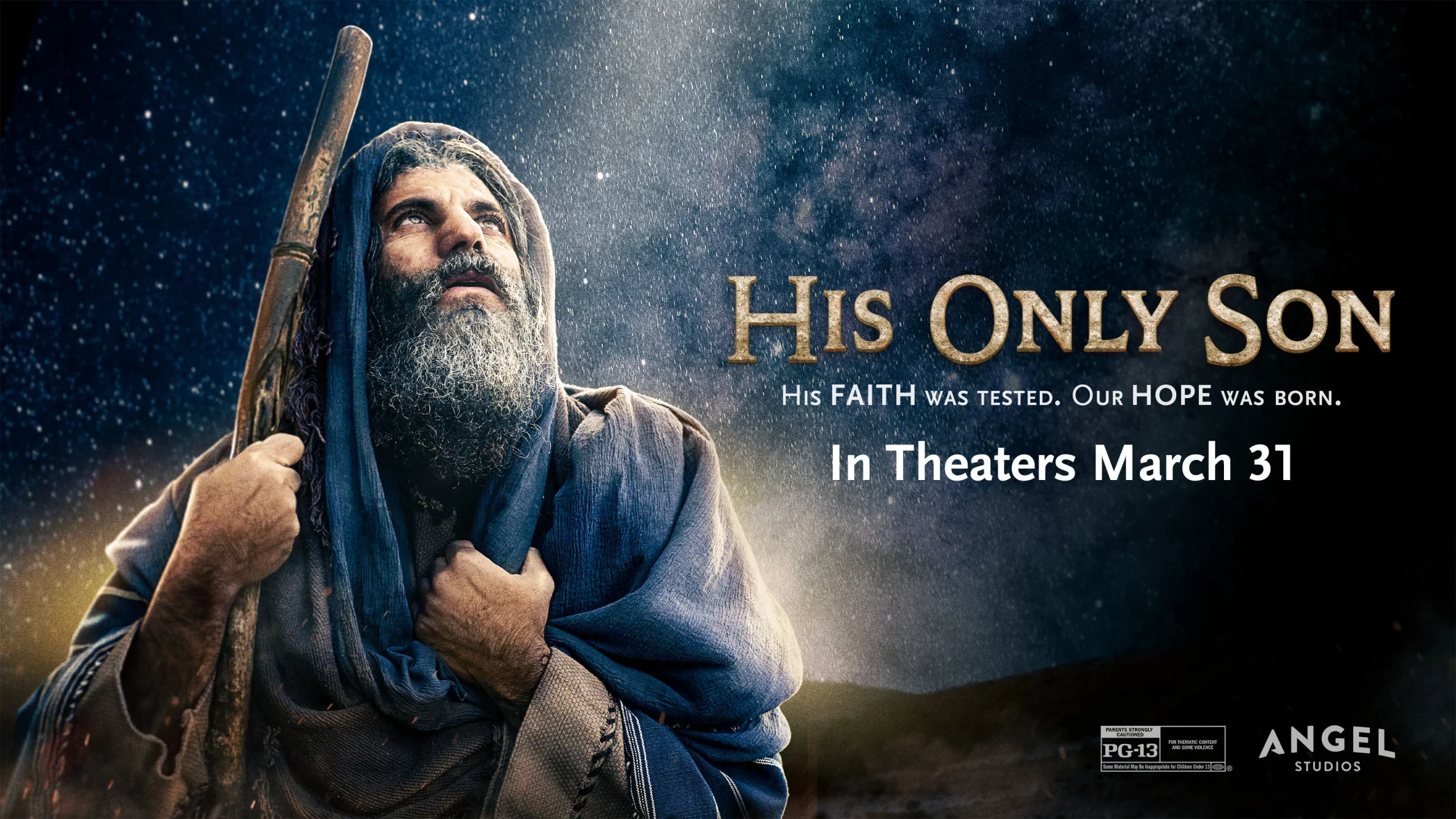On March 31, in theatres around the country, His Only Son, a Christian movie by David Helling depicting the binding of Isaac, will open. Except for some Christian references at the beginning and end of the epic, the film fits in well with Jewish exegesis. It’s a fascinating cinematographic midrash on Genesis 22:1-19.
As Abraham (Nicholas Mouawad) and Isaac (Edan Moskowitz) walk on a three-day journey to Mt. Moriah, the patriarch thinks back to all those years that he and Sarah could not conceive a child. In flashback, the story is told how Abraham (then known as Abram) was prompted by God (voice of Daniel Da Silva) to leave Ur of Chaldees to a land that God would show him, and where God said the number of his descendants would number like the stars in the sky. In the company of his wife Sarah (then known as Sarai) he trekked and trekked, but Sarah (Sara Seyed) remained barren.
On a climactic night, Sarah, seeing the disappointment in Abraham’s eyes, tells her husband to “go into” her maid Hagar (Eta Pico) in the hope that God’s promise of descendants will be fulfilled. After Hagar gives birth to Ishmael (not depicted in the movie), the maid cannot hide her contempt for her barren mistress. When Ishmael begins to act contentiously with Isaac, Sarah with Abraham’s approval banishes them both.
Before she herself became pregnant, Sarah accused Abraham of having sinned by having sexual relations with Hagar, even though, as Abraham protested, Sarah herself initiated the idea. “I have clung to you … year after year .. waiting for what you claim the Lord has promised,” says a tearful Sarah. “Now after all this, what do I have? A husband that I must share, a bed that has been stained, and hope that has faded away .. It’s your fault, all of this … I am such a fool!”
All was forgiven when Isaac was born, but now, Abraham reflects ruefully, his only child by Sarah is inexplicably marked for sacrifice on the Lord’s orders. No amount of praying seems to deter God from this command. Perhaps death is the penalty for sinning, Abraham speculates, and for the sin of consorting with Hagar, the Lord is punishing him by taking away Isaac. Even when Abraham offers himself as a substitute sacrifice, God does not respond to his pleas.
The slave Eshcolam (Nicolai Perez) sullenly questions Abraham about the need to travel three days to make a sacrifice. Abraham says he doesn’t know the reason, only that God has commanded it. Resentful that he is enslaved and that Abraham seems to hold his Philistine people in low regard, Eshcolam aggressively continues to question Abraham, notwithstanding remonstrances from Eliezer, Abraham’s more faithful servant. In a scene that reflects the modern controversy between Palestinians and Israelis, Eshcolam rushes at Abraham, declaring “This is my land!” and Abraham knocks him down with a staff.
Soldiers loyal to King Abimelech, who have murdered a wayfarer and captured his daughter, pass by and are called upon by Isaac to release the girl, offering even to exchange his life for hers. The soldiers ignore the offer, instead beating Isaac as well as Abraham who tries to protect his son. There is no passage in Torah similar to this, but the episode illustrates that Isaac is willing to sacrifice his own life for a good cause.
Eventually, the foursome arrives at Mount Moriah, and here the movie faithfully follows Torah. Isaac asks: “Here are the fire and the wood, but where is the lamb for the offering?” Abraham replies, “God will seek out for Himself the lamb for the offering my son.”
Again departing from Torah, the movie has a tearful Abraham explaining to Isaac that God has commanded him to slay him, for what reason he knows not. Isaac submits himself, comforting his father. But then, as we all know, a heavenly voice restrains Abraham as he lifts his knife. “Do not stretch out your hand against the lad nor do anything to him for now I know you are a God-fearing man, since you have not withheld your son, your only one, from Me.”
This line from Torah has always puzzled me because Abraham had two sons: Ishmael and Isaac. And from both of them great nations were to arise.
There is charm in the casting of this Bible movie. Mouawad, who plays Abraham, is Lebanese. Sayed, who plays Sarah, is Iranian, and Moscowitz, who plays Isaac, is Israeli – so we have much of the Middle East covered with representatives of countries that are in a state of war, yet simultaneously revere Abraham’s legacy.
The pacing of the movie is a bit slow, but the cinematography, utilizing desert landscapes, is excellent. I recently spent some time in the Anza-Borrego Desert State Park, and it almost felt while watching the movie that I was there again.
Republished from San Diego Jewish World


























